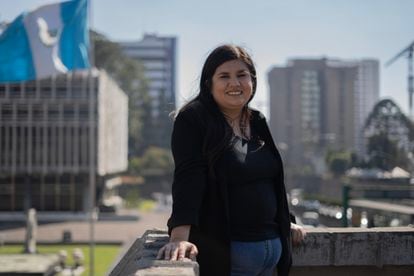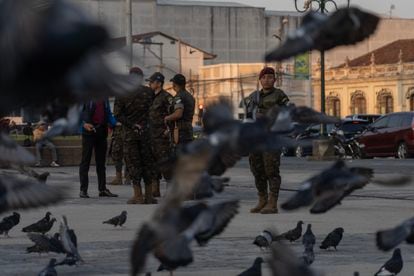This Sunday an image will be seen in Guatemala that seemed impossible half a year ago. The progressive sociologist Bernardo Arévalo (Montevideo, 65 years old) will be inaugurated as president of the Central American country in a ceremony at the Miguel Ángel Asturias cultural center in the capital. If there are no last-minute surprises, something that few dare to rule out after a long process of transition of power loaded with judicial obstacles and in which the president-elect himself has denounced an attempted coup d'état to prevent him from taking office, at leader of the Semilla Movement will be given the presidential sash in an event attended by a dozen Latin American leaders and the King of Spain.
Arévalo, a diplomat expert in conflict resolution who has also been a deputy, will assume the Presidency with the main promise of fighting corruption in order to later tackle the problems of the most populous country in Central America, with more than 17 million inhabitants, high rates of poverty and inequality and great development needs in education, health or infrastructure. His electoral offer has squarely confronted him with what in Guatemala they call the “corrupt pact,” an informal alliance of politicians and bureaucratic and business elites who protect each other to maintain power. The most recent signs came after Arévalo's unexpected victory in the first round in June and his subsequent triumph in August, when the Public Ministry headed by the attorney general, Consuelo Porras, began a series of attempts to derail the transition of power. through judicial means.
These attempts failed mainly thanks to the firm defense of democracy and the vote of Guatemalans promoted by indigenous movements throughout the country, which have been resisting for more than 100 days with different actions, such as a sit-in in front of the headquarters of the Public Ministry. in Guatemala City. And also due to the constant condemnation of the international community, which has denounced every offensive by the Prosecutor's Office to prevent the inauguration of the elected president and disqualify his party, the Semilla Movement.
Late this Saturday afternoon, without going any further, the high representative of the European Union for Foreign Affairs and Security Policy, Josep Borrell, announced in a press conference with Arévalo the adoption of a “legal framework of sanctions that may be applied against those who hinder the normal development of the democratic process in Guatemala.” His visit to the Central American country, said Borrell, “is the demonstration of the firm commitment of the European Union to the people of Guatemala and its democracy, a democracy that has been threatened and that we are here to defend and support,” he added.
And although a ruling issued by the Constitutional Court in mid-December offered guarantees for Arévalo to be sworn in this Sunday, Guatemala still lives in the uncertainty of whether the inauguration will be respected or they will try to stop it with some last-ditch judicial attack. hour. Among the unknowns is also whether the outgoing president, Alejandro Giammattei, under whose government there has been an increase in authoritarianism, will attend the Congressional event as planned or will not attend; and also whether the takeover of the Semilla Movement bench will be guaranteed to be able to operate and even preside over a chamber in which the ruling party will be in the minority.
A Government with great expectations and without a honeymoon
In any case, the Government team is aware that, with the inauguration of Arévalo, one obstacle course ends but another begins. “We understand that what is coming is much heavier […] It's not going to be easy having against several State institutions that declared themselves coup plotters from day one,” says Semilla's elected representative Andrea Reyes, a 33-year-old lawyer who emerged from the student movements who has spent the last half year defending his party from the attacks coming from the Public Ministry from the legal trenches. Arévalo assured that, after assuming command, he will demand the resignation of Consuelo Porras, who in 2022 was sanctioned by the United States “for participating in significant acts of corruption” and whom he has accused of leading the attempted coup against him. “One of the first actions, if not the first, will be to demand the resignation of the attorney general,” the president-elect said weeks ago. That will, in all likelihood, be his first response to the official's sure resistance.

Reyes also defends that the arrival of Semilla to the Executive represents a new way of doing politics based on the dialogue of ideas compared to the one in force in the country in the last 40 years which, he says, was based on “negotiations and money.” : “Politics has been a business and a happy confluence of interests of people who want to control some type of State institution, and that is what has moved politics since 1985 until now. It is somewhat complicated for ideologically motivated people to come to power and begin to establish a programmatic framework so that Guatemala can move forward in accordance with our principles. “It is something unprecedented,” he maintains.
In addition to generating governability with part of the judiciary against it and with a minority in Congress, political analyst Raquel Zelaya believes that the Arévalo Government will have to learn to manage the overexpectations of a sector of the population that supported them, and also reward the indigenous movements. “The indigenous population played their part, they have shown impressive civic maturity and they were fundamental for some of the triumphs and the stages that were overcome,” says Zelaya, who chairs the Association for Research and Social Studies (ASIES) of the Rafael Landívar University. .
The first decision in this sense by the Arévalo Government disappointed a sec
tor of the population. It was the announcement of his cabinet, a joint team of seven men and seven women, among whom there is only one indigenous person, the Minister of Labor and Social Welfare, Miriam Roque. The president-elect himself acknowledged that he was “indebted to the multiculturalism” of the country, but showed his intention to incorporate these peoples into other levels of Government. While the Board of Directors of Communal Mayors of the 48 Cantons of Totonicapán, the indigenous organization that has led the resistance in defense of democracy that promoted his presidency, has regretted that the cabinet does not reflect the peoples that make up the country, the Mayan, the Garífuna and the Xinka.
For Zelaya, beyond the appointment of ministers, Arévalo must promote a decentralized government and implement “policies that help to have a plural Guatemala as at the time in the peace agreements.” In that sense, he advocates for the dialogic nature that the president-elect has shown throughout his career. “He is a character of the nature of consensus, of rapprochement of positions. That has been the strength of his international career and I believe that he has a party base that, on the contrary, due to his youth, because he does not have much experience, is quite adverse to these positions. So, he will also have to manage within his party those currents of thought that are quite strong,” continues the analyst in reference to the different sectors of the Semilla Movement.
Furthermore, he advocates for “an absolutely transparent executive” who denounces any anomaly in appointments, purchases or contracts without “his pulse trembling whoever it is.” “This is how you will earn respect,” says Zelaya. “The most realistic thing is for him to promise and deliver with a transparent executive which, in the long run, is the same as fighting corruption. What happens is that it is very rooted and that is why overexpectations come.”

“Guatemala needs this administration to be successful. These are the last opportunities we have for a minimum democratic balance,” says the president of ASIES. “If this administration does not have achievements, our situation could be very precarious because organized crime is very empowered. Many of the district deputies who arrive are linked to them and we have to pay much more attention to it than with any other issue.”
These high expectations generated by the Semilla Movement, a party that was born in the heat of the 2015 street protests against corruption, are recognized even by representatives of its party, such as representative Andrea Reyes: “I feel that we are pulling the country out of the mud. It is very sunk, it is very complicated, and the fear we have is that at the end of the period we will have spent all the time defending the Government and we will not really be allowed to work. “That is a reality that we will have to deal with in the next four years and guarantee notable results to get Guatemala out of underdevelopment.”
#Bernardo #Arévalo #assumes #presidency #Guatemala #continue #obstacle